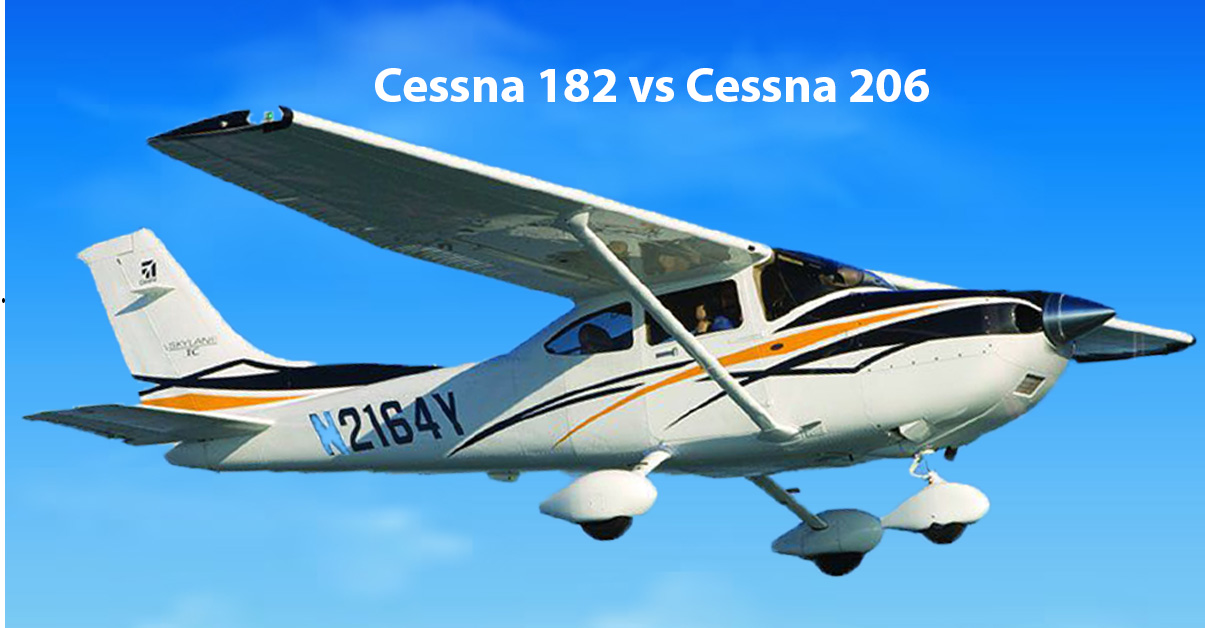When it comes to single-engine aircraft, the Cessna 182 vs 206 stand out as two of the most popular choices among pilots and aviation enthusiasts. Both aircraft offer unique features, performance capabilities, and uses, making them suitable for different types of flyers. This blog post aims to provide a comprehensive comparison between the Cessna 182 and Cessna 206, helping you to decide which aircraft best suits your needs.
Cessna 182 vs 206
When comparing the Cessna 182 vs 206, you’re looking at two of the most popular single-engine aircraft, both beloved for their reliability and versatility. The Cessna 182, often referred to as the Skylane, is known for its ease of flying and is a favorite among private pilots for its balance between performance and affordability. It seats four people comfortably and is great for shorter, regional flights.
Here’s a comparison table of the Cessna 182 vs 206 based on the specifications you provided:
| Feature | Cessna 182 | Cessna 206 |
|---|---|---|
| Engine Power | ~230 HP | ~300 HP |
| Cruise Speed | 145 knots | 142 knots |
| Range | 930 nm | 840 nm |
| Payload | 1,100 lbs | 1,380 lbs |
| Passenger Capacity | 4 | 6 |
| Cabin Size | Smaller | Larger |
| Operating Costs | Lower | Higher |
| Powerplant | Lycoming IO-540-AB1A5 | Lycoming TIO-540-AJ1A |
| Propellers | Constant speed | McCauley 3 blade metal, constant speed |
| Length | 29 ft | 28 ft 3 in |
| Height | 49 in | 9 ft 4 in |
| Wingspan | 36 ft | 36 ft |
| Wing Area | 174 sq ft | 174 sq ft |
| Wing Loading | 17.8 lbs/sq ft | 21.78 lb/sq ft |
| Power Loading | 13.5 lbs/hp | 12.22 lb/hp |
| Cabin Width | 42 in | 43 in |
| Empty Weight | 2,000 lb | 2,365 lb |
| Maximum Gross Weight | 3,100 lb | 3,806 lb |
| Useful Load | 1,110 lb | 1,441 lb |
| Payload with Full Fuel | 588 lb | 919 lb |
| Fuel Capacity | 87 gal | 87 gal usable |
| Baggage Capacity | 200 lb | 11 cu ft, 180 lb |
| Takeoff Distance (Ground Roll) | 795 ft | 1,060 ft |
| Service Ceiling | 18,100 ft | 26,000 ft |
| Landing Distance (Ground Roll) | 590 ft | 735 ft |
| Cruise Speed/Endurance | 145 KTAS / 915 nm | 161 KTAS |
This table highlights the key differences between Cessna 182 vs 206, including performance, capacity, and physical dimensions, providing a clear comparison to help in decision-making.
Cessna 182
The Cessna 182, also known as the Skylane, is a single-engine aircraft that’s a favorite among pilots for its mix of reliability, affordability, and performance. It’s designed to comfortably seat four people, making it a great choice for small families or groups wanting to enjoy the skies together. What makes the Cessna 182 stand out is its ease of flying, which appeals to both novice and experienced pilots. It’s perfect for short to medium-distance flights, whether you’re flying for leisure, getting to a business meeting, or going on an adventure. The 182 has a sturdy build and a powerful engine that provides a smooth flying experience. Its popularity over the years has made it a common sight at airports around the world, earning it a reputation as a trustworthy and dependable aircraft for a wide range of flying needs.

Cessna 206
On the other hand, the Cessna 206, known as the Stationair, is the larger and more powerful of the two. It’s designed to carry more passengers or cargo, seating up to six people, and is well-suited for a variety of missions, including cargo transport and skydiving operations. The 206’s larger cabin and higher payload capacity make it the go-to for those needing more space and power, albeit at a higher operating cost. Both planes offer high reliability and are excellent choices, but your selection between the two ultimately hinges on your specific needs for space, performance, and budget.


Design and Comfort
The Cessna 182, renowned for its reliable design, offers a comfortable and spacious cabin, suitable for both personal and business flights. The interior is thoughtfully laid out with four seats, providing ample room for passengers. The ergonomic design of the cockpit makes it a favorite among pilots for its user-friendliness and comfort during long flights.
The Cessna 206 takes comfort a notch higher with its larger cabin, accommodating up to six passengers. It’s designed with more cabin space, offering greater comfort for longer journeys. The 206 is particularly favored for its versatility in seating configurations, catering to both passenger and cargo needs.
Performance, Capacity, and Range
The 182 is equipped with a powerful engine, offering robust performance and reliability. It is well-suited for a variety of missions, from short hops to longer journeys, with a range that covers significant distances with ease. Its carrying capacity is also commendable, balancing payload and fuel efficiency effectively.
The 206, with its higher horsepower engine, excels in performance, especially in challenging environments. It boasts a larger carrying capacity and a range that supports more demanding flight missions. This aircraft is known for its strength in utility operations, including cargo and passenger transport.
Tech and Efficiency
The 182 integrates advanced avionics and technology, enhancing its efficiency and safety. Its modern navigation and communication systems make it a reliable choice for both new and experienced pilots. The Cessna 206 also comes equipped with state-of-the-art technology, but its larger size and power make it slightly less fuel-efficient than the 182. However, its capabilities in handling heavier loads and more challenging terrains compensate for this.
Airline Economics and Operations
The Cessna 182’s operational costs are generally lower, making it a cost-effective option for small businesses and private owners. Its versatility and efficiency also make it a popular choice for flight schools and charter services. In contrast, the Cessna 206, due to its larger size and more powerful engine, incurs higher operational costs. However, its greater capacity and utility value make it a preferred aircraft for commercial operators who require a more robust and versatile aircraft.
Role in Modern Airline Fleets
The 182 plays a significant role in modern fleets, especially for training, personal, and business aviation. Its reliability and versatility make it a staple in diverse aviation operations. The 206, with its higher capacity and utility, is often used in commercial operations, including air taxi, cargo, and specialized services like aerial photography and surveillance.
Cessna 182 vs 206 Pricing
The Cessna 182 is more budget-friendly, appealing to individuals and small businesses seeking an affordable and reliable aircraft for short flights. In contrast, the Cessna 206, with its larger capacity and more powerful engine, comes at a higher price, reflecting its broader versatility for carrying more passengers or cargo. While the 182 is ideal for cost-conscious buyers prioritizing efficiency, the 206 caters to those needing extra space and capability, making it suitable for more demanding operations. The choice between the two hinges on balancing cost against the specific needs and intended use of the aircraft.
Cessna 182 Price
Cessna 182 Skylane: The price range for used Cessna 182s can vary greatly. Older models from the 1970s and 1980s might be found in the range of approximately $100,000 to $200,000, while newer models, especially those produced in the 2000s or later, can cost upwards of $400,000 or more, depending on their condition and specifications.
Cessna 206 Price
Cessna 206 Stationair: The Cessna 206 tends to be more expensive due to its larger size and capacity. Used models can range from about $200,000 for older versions to well over $600,000 for more recent models with low hours and updated avionics.
History and Overview
Cessna 182 Skylane
The Cessna 182, also known as the Skylane, is a four-seat, single-engine, light airplane that made its first flight in 1956. It has been in production for over six decades, with various models and upgrades introduced over the years. Renowned for its reliability and versatility, the 182 is popular among private owners, flight schools, and charter companies.
Cessna 206 Stationair
Introduced in 1962, the Cessna 206, commonly referred to as the Stationair, is a six-seat, single-engine aircraft. It’s known for its larger cabin, higher payload capacity, and versatility. The 206 is often used for cargo, passenger transport, and in various utility roles, including aerial photography and parachute drops.
Feature Comparison
- Cabin Size and Comfort: The Cessna 206 offers a more spacious cabin compared to the 182. This makes it more comfortable for longer trips, especially with more passengers.
- Versatility: While both aircraft are versatile, the 206’s larger cabin and payload capacity make it more suited for utility roles.
- Landing Gear Options: The Cessna 182 offers a retractable gear option (RG), enhancing its speed and performance. The 206, however, is only available with fixed gear.
- Operating Costs: The Cessna 182 generally has lower operating costs due to its smaller engine and lighter weight. The 206’s larger engine and size result in higher fuel consumption and maintenance costs.
Ideal User Profile
- Cessna 182: Ideal for private owners, flight training, and light touring. Perfect for those who need a reliable, easy-to-operate aircraft for shorter trips.
- Cessna 206: Suited for commercial operations, cargo transport, and special missions. It’s the go-to aircraft for those requiring more space and payload capacity.
Conclusion
Choosing between the Cessna 182 vs 206 depends largely on your specific needs and preferences. The 182 is an excellent choice for those seeking a reliable, cost-effective aircraft for personal use or flight training. Meanwhile, the 206 is more suited for commercial operations, offering greater capacity and versatility. Regardless of your choice, both aircraft uphold Cessna’s reputation for durability, reliability, and value in aviation.
FAQs
Q: Which aircraft is better for beginners?
A: The Cessna 182, with its simpler operation and handling, is generally more suitable for beginners.
Q: Can the Cessna 206 be used for commercial purposes?
A: Yes, its larger size and payload make it ideal for commercial uses like cargo and passenger transport.
Q: What is the main advantage of the Cessna 182 over the 206?
A: The main advantage of the Cessna 182 is its lower operating cost and ease of handling, making it more suitable for personal use and flight training.
Q: Is the Cessna 206 a good choice for short, unpaved runways?
A: Yes, the Cessna 206 is known for its ability to operate from shorter, rougher airstrips, thanks to its robust design and higher payload capacity.
Q: How does the maintenance cost compare between the two aircraft?
A: The Cessna 182 generally has lower maintenance costs due to its simpler design and smaller engine. The 206, with its larger engine and more complex systems, can incur higher maintenance expenses.

